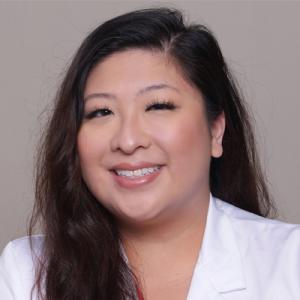Student Spotlight: Veronica Nguyen
Veronica Nguyen
Accelerated Bachelor of Science in Nursing student, Veronica Nguyen, talked with us about her experience at GW, being in the nursing program, and how COVID has affected her experience.
Q. Why do you want to be a nurse?
I started my professional career in a completely different field of study. At one point in my life, I felt like something was missing. I spoke with family members and close friends about my worries, and they suggested I look into the medical field. I spent several months researching medical schools and prepared myself for the possibility of changing careers. While completing an information session with a nearby medical school, I stumbled on a video filmed by a nurse’s sister. It was a tribute to her sister’s strength and mental fortitude after losing a patient. After watching the video a dozen times, I wanted to learn more about nurses and their processes. I learned that nurses are individuals who dedicate themselves to their practice and patients. Their philosophy promotes compassion, advocacy, education, and patient empowerment. I then realized that I wanted to be a part of the nursing community and serve patients with the same commitment to compassionate care.
Q. Why did you choose GW?
As someone who grew up in and around Virginia, I wanted to find a school that was close to home. I also wanted to attend a school that would allow me to serve culturally diverse and vulnerable populations. When searching for schools, GW came up several times through word of mouth and online resources. After more research, I felt that GW offered learning opportunities that reflected the nursing workforce’s current needs and the technological advances of our time. The proximity of both D.C. and Ashburn also allow me the freedom to stay near my loved ones. During the application process, I was able to chat with alumni who spoke wonders about the school, the faculty, and their clinical experiences.
Q. Describe a memorable experience from your time at GW.
One of the most memorable experiences I had at GW resulted from my first failed exam. As someone that considers themselves a good student, it was an incredible blow that made me doubt my place in the program. The program is rigorous, and at some moments, you think about giving up. I believe members from my cohort and a few faculty members could tell how I was feeling. As I sat in Innovation Hall with a sullen look on my face, several people came by to comfort me and to reassure my dedication to the program would help me through. Faculty members contacted student tutors for me and took the time to review my exam during their office hours. At one of my most vulnerable moments, my peers and faculty were there for me. I will never forget their kindness and support.
Q. What do you find challenging about nursing and how do you overcome it?
I think one of the most challenging aspects of nursing is feeling like you aren’t enough. It can certainly be daunting to enter a patient’s room and feel like you aren’t equipped with enough knowledge to care for them. A way to overcome this fear is to be honest. As future nursing professionals, it’s essential to build a therapeutic relationship with your patient based on mutual trust. By saying, “I’m not too sure about that, but I’d be more than happy to look that up for you and come back with a better answer,” you open the channels of communication. Being honest about your knowledge and abilities is not a weakness. Instead, it is a strength and humbling experience to go back to evidence-based sources and teach your patient the education they need to care for themselves and others.
Q. In light of the COVID-19 pandemic, how has your perspective on the power of nursing changed?
One aspect of nursing that drew me to the career is the focus on patient advocacy. During the COVID-19 pandemic, the role of advocacy has not necessarily been altered. Instead, it has been amplified due to changing hospital policies and patient needs. For example, several hospitals allowed only one visitor to reduce the virus from spreading to multiple people. This policy change resulted in personal and emotional sacrifices. Patients were unable to seek comfort from their loved ones, and in some cases, families tearfully said their goodbyes from afar. As powerful patient advocates, nurses made incredible efforts to maintain open communication lines between their patients and loved ones. Nurses kept families up to date and relayed messages filled with hope and love to their patients. As the pandemic continues, their role as advocates remains integral to the health and well-being of all patients.
Q. What is your advice for future nurses?
My advice to future nurses is to be kind to yourself. As a vocation, nursing can undoubtedly be one of constant self-sacrifice. It’s important to remember that we, too, are individuals that need care and support. I found myself at my wit’s end several times a month throughout nursing school due to constant worry about tests and assignments. Looking back, I wish I had told myself to be patient with myself. I would tell my past self to get that extra hour of sleep or go out with my friends on the weekend for a couple of hours. By taking care of yourself, you are better equipped to take care of others. Also, remember that your journey is unlike anyone else’s. We can determine our future through our actions and words. Work hard to become the nurse you want to be while also taking care of yourself and meeting your needs.


